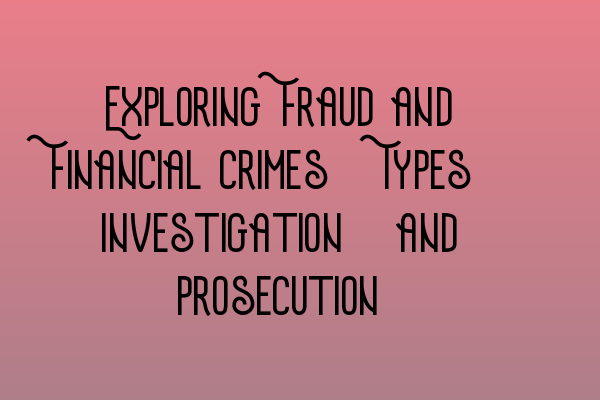Exploring Fraud and Financial Crimes: Types, Investigation, and Prosecution
Welcome to the SQE Criminal Law & Practice Law UK blog! In this post, we will dive deep into the intriguing world of fraud and financial crimes. As solicitors at SQE, we specialize in dealing with these complex cases, ensuring justice prevails. Whether you are a law student, legal professional, or simply interested in learning more about this area of law, you’ve come to the right place!
Fraud and financial crimes encompass a wide range of illegal activities, all aimed at deceiving individuals, organizations, or the government for personal or financial gain. Let’s explore some of the most common types:
1. Identity Theft
Identity theft occurs when someone illegally obtains another person’s personal information, such as their name, Social Security number, or bank account details. With this information, the perpetrator can commit various fraudulent acts, such as opening credit accounts, making unauthorized purchases, or filing false tax returns. Our SQE 1 Practice Exam Questions will equip you with the knowledge to tackle identity theft cases effectively.
2. Money Laundering
Money laundering involves disguising the origins of illegally acquired funds by making them appear legitimate. Criminals often resort to complex schemes to “clean” the tainted money, making it difficult to trace. SQE offers comprehensive SQE 1 Practice Mocks FLK1 FLK2 to help you understand the intricacies of money laundering and its detection.
3. Insider Trading
Insider trading refers to the illegal buying or selling of stocks, based on material non-public information. This unfair practice undermines the integrity of financial markets and can lead to severe financial losses for unsuspecting investors. Enhance your knowledge of insider trading with our specialized SQE 2 Preparation Courses.
4. Tax Evasion
Tax evasion involves intentionally evading the payment of taxes owed to the government. This can be accomplished through various means, such as underreporting income, inflating deductions, or hiding assets in offshore accounts. Our comprehensive SQE 1 Preparation Courses will provide you with the tools to understand tax evasion laws and effectively represent clients in such cases.
Investigation and Prosecution
When fraud and financial crimes are suspected, a thorough investigation is crucial to gather evidence and build a strong case for prosecution. Law enforcement agencies, such as the Serious Fraud Office (SFO), often work hand-in-hand with solicitors to uncover the truth and bring the perpetrators to justice.
To successfully navigate the investigation and prosecution process, solicitors must possess diverse skills, including advanced knowledge of financial regulations, forensic accounting, and interviewing techniques. Our experienced team at SQE excels in these areas and offers invaluable insights to aspiring solicitors.
In conclusion, fraud and financial crimes pose significant challenges to the legal system. As solicitors at SQE, we remain committed to combating these offenses and ensuring a fair and just society. Stay updated with the latest SRA SQE Exam Dates so you can embark on your journey to become a professional in criminal law and practice.
